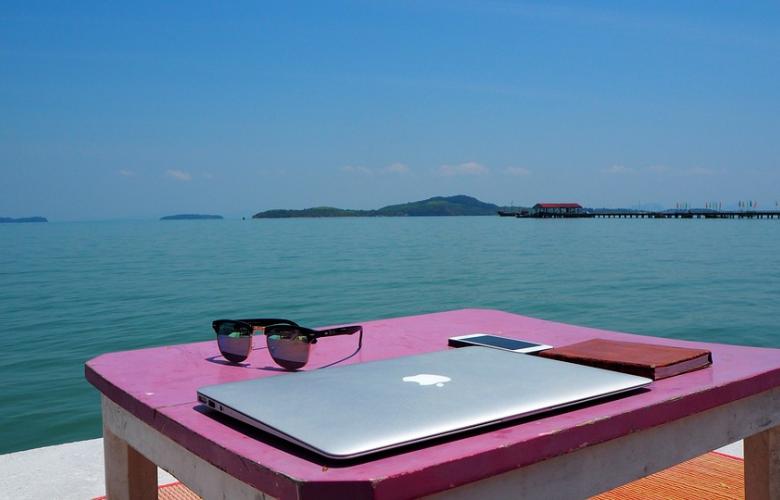The world is connected like never before and Indonesia is keen to take advantage of the possibilities this brings. Bali, in particular offers opportunities for millennials and a range of digital entrepreneurs, which some believe could make it a regional hub for startups and digital innovation. These combined with Bali’s popularity as one of the world’s leading tourism destinations are creating a ‘perfect storm’ according to some observers.
Founder of the Bali Creative Economy, Eko Budi Cahyono, speaking at a Creative Industries Movement event held last weekend, outlined the unique opportunities Bali has to offer in this new age. He explained that millennial workers were not tied into traditional concepts of office space or 9-5 jobs; they use digital technologies, internet access and co-working spaces for almost everything and this means there are really no restrictions on where or how they can work. In fact the only limitation is creativity itself.
What makes Bali so special for millennials and digital entrepreneurs?
There are many professions such as writers, programmers, designers, website developers, photographers, translators, internet marketers and IT consultants who can, and do work from anywhere and Bali is able to offer them access to the tools of their digital trade while providing beautiful locations to stay and unique cultural aspects to experience. All of which helps with their creativity.
The Right Time in The Right Place
There are four key aspects that make Bali a fertile place for digital lifestyles and growth.
First; creative ecosystems in Bali support the establishment and development of startups, which are intrinsically connected to creativity and technological innovation.
Second; Bali is physically well located and has great access to easily tap into markets and opportunities in the digital economies of Indonesia as well as the rest of Southeast Asia.
Third; the quality of life in Bali is good and conducive to those in creative industries. Housing is also relatively cheap when compared to other major Asian cities.
Fourth; Bali’s position as a world-class tourist destination attracts foreign investors and those interested in funding and raising home-grown startups.
Gapura Bali reported last year on the growing trend in the number of digital nomads looking to spend time and energy in Bali, something reinforced in the Creative Industries event. Eko explained that "many foreigners are now opening startups in Bali that have global market coverage. Bali could become a digital paradise in Asia and even be the centre of an ecosystem for startups and technology companies in Silicon Valley," he said.
Deregulation and Opportunity
A report released recently by Google and worldwide investment company Tamasek ranked Indonesia #1 in Southeast Asia for e-Commerce transactions in Southeast Asia suggesting as much as 60 percent of ASEAN's digital economy market is in Indonesia.
The potential this brings, combined with government initiatives in developing “Smart Cities” across Indonesia, of which Denpasar is one, and the most recent relaxations to the Negative Investment List (DNI) in the 16th Economic Package allowing majority foreign ownership in telecommunications networks, content services, call centres and fixed telecommunications networks is setting the groundwork for a seismic shift in the way the country does business and for the investment opportunities about to happen.
Co-working Spaces
Some of the first forays into digital economies in Bali have been through co-working spaces and one of the most successful has been Hubud.
Co-working, according to Eko is not just a room or facility but offers 3C’s, namely Community, Connection, (networking) and Collaboration. Co-working creates a support system, a professional community that is relevant for digital nomad businesses and jobs with digital startup activists.
Andrzej Barski, Principal of Harcourts Seven Stones told WILLIAMS MEDIA “Hubud is a great example of how the digital economy can have a positive impact on people’s lives. It’s so much more than a co-working space. They provide access to guest speakers, mentors and trainers and are open to everyone who wants to make their future digital.”
It is important to remember Bali’s (and Indonesia’s) digital future is not limited to foreign investors and their ideas. With a growing young, middle class population, Indonesia’s entrepreneurs are also taking advantage of easier internet access and government support. They are getting creative, starting up more small and medium scale businesses and attracting eye watering investment funds to make things happen.
According to the recent Google-Tamasek report, USD 16 billion has already been invested into some of Indonesia’s startup unicorns including, GoJek, Bukalapak and Traveloka among others.
Minister of Industry Airlangga Hartarto also encouraged millennials to take full advantage of the opportunities the government is building to facilitate creative industries telling local newswires, these centres, such as Bali’s Creative Industry Centre, are “expected to be an inspiration and aspiration to grow and develop new industrial entrepreneurs.”
Sources: Tribun Bali, Bali Post, iNews, Gapura Bali, Google
Similar to this:
Start-ups offer significant potential for developing office buildings in Bali
16th Economic Policy Package relaxes regulations on foreign owned businesses in Indonesia
Indonesia ranks #1 for e-Commerce transactions in Southeast Asia





